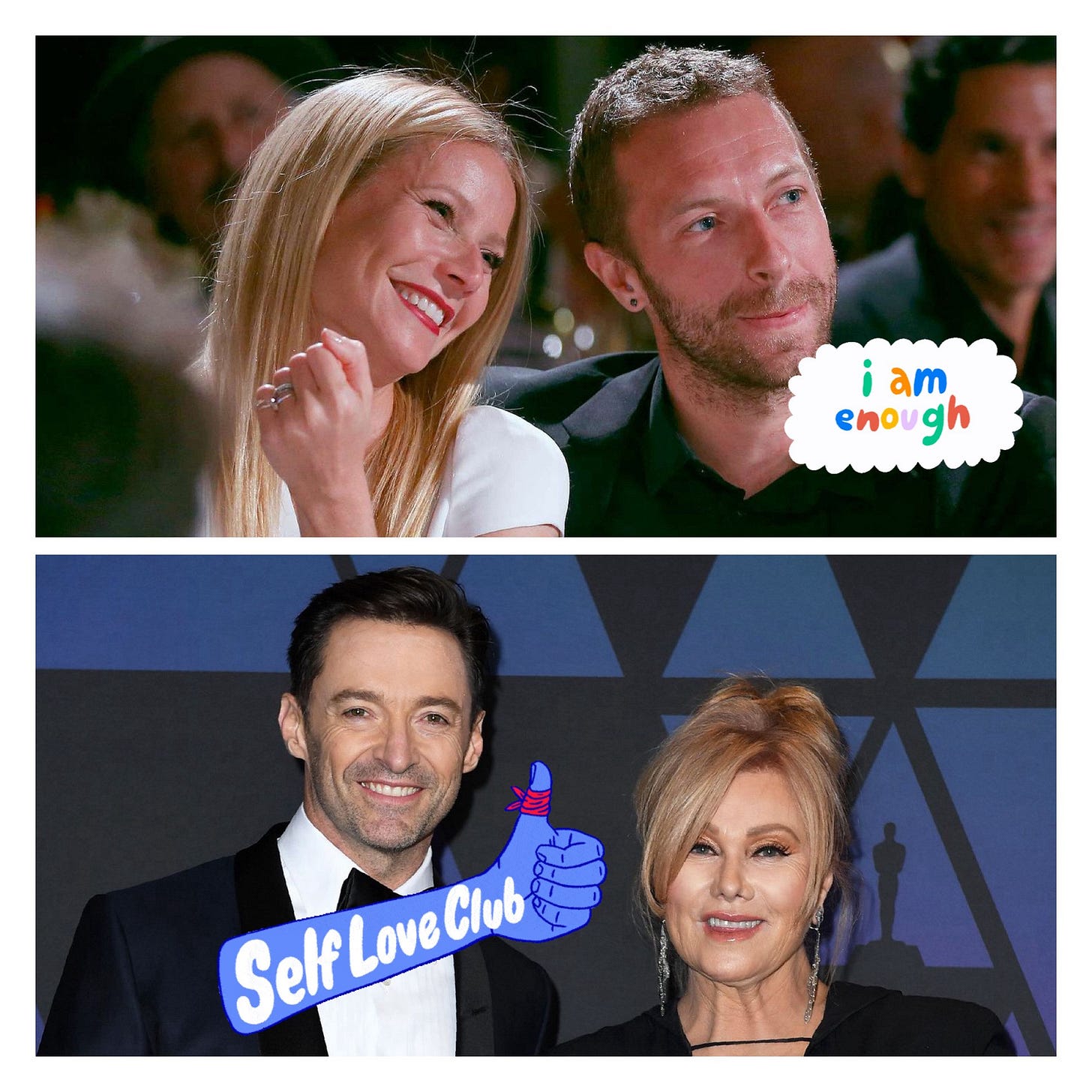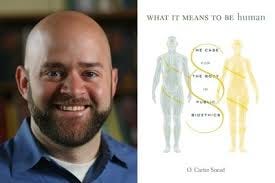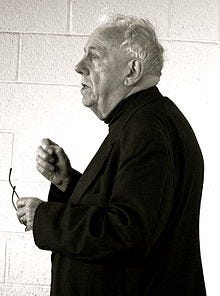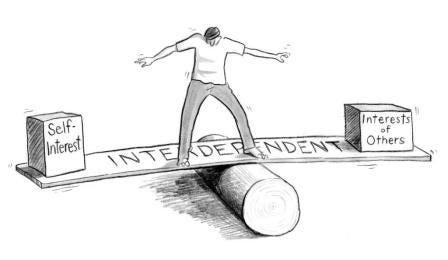The Tale of Two Anthropologies
*Audio Available* Celebrity Divorce Announcements, Abortion and Trans, and A Better Way to Be Human
I am considering doing a short series on this topic considering the US vs. Skrmetti supreme court case happening right now. As I sit here typing, the SCOTUS is hearing arguments that could either protect or ban irreversible, so-called “gender affirming care” treatments for children in the US. If you haven’t looked into the case, I recommend you do. What I am most interested in however is how our anthropology, our deep and unquestioned beliefs about what it means to be human, are the source of so much of both public and private life.
Today, the most pressing questions are almost all anthropological in nature, whether the questioner knows it or not. What is a woman? What is a person? These are not simply hot-button culture war issues, they are deep questions about what it means to be human. We are witnessing what can only be described as an anthropological crisis; a struggle between two fundamentally opposed visions of what it means to be human, both of which have vast and profound consequences. Consequences that impact us, our most basic human relationships and our social order broadly.
One of the most influential books written on this is O. Carter Snead’s “What It Means to Be Human.” Please watch this 5 minute video clip of Snead laying the foundation for this discussion.
Deep and unquestioned beliefs about the human condition are tearing us apart, ripping our bodies from our souls and unfastening us from our most fundamental human relationships and institutions.
How does this play out in culture more broadly, and is there a better vision of human life available to us?
First, a quick clarification
When I say anthropology here, I am not talking about the study of human societies, cultures and their development. Nor am I talking about the trendy and overly priced clothing and home goods store where you can by a pink velvet dining chair for $468.
When I use the word anthropology here, I am talking about “the theology dealing with the origin, nature, and destiny of human beings” (Merriam-Webster). Put simply, for our purposes, anthropology refers to a fundamental understanding of what it means to be human.
The tale of two anthropologies
O Carter Snead is a renowned bioethicist who argues in his book that our entire American legal system rests on what he calls “the anthropology of expressive individualism” he says,
“…this anthropological frame [expressive individualism] decisively privileges cognition and will in defining personal identity… It dualistically distinguishes will and cognition from the body and treats the body itself as primarily a tool for pursuing one’s own freely chosen goals. It understands human relationships as transactional, formed by agreements, promises, and consent for the mutual benefit of the parties involved… In this paradigm, the goods of autonomy and self-determination enjoy the pride of place among ethical and legal principles. Law and government exist chiefly to create the conditions of freedom to pursue one’s invented future, unmolested by others and perhaps even unimpeded by natural limits.” (emphasis mine)
This quote points to some of the vital conflicts of the day, I’m mostly thinking of abortion and transgenderism, both of which are discussed at length in Snead’s book.
But I want to first shift your eyes to another vital conflict and ever-present spectacle of our culture: celebrity divorce announcements.
As shameful as it is for me to admit, I am overly invested in celebrity divorce announcements. One day I decided to interrogate my fascination with them and discovered that the reason for my fixation is that they perfectly communicate the anthropology of expressive individualism. Hugh Jackman’s recent divorce announcement is a premier example,
“We have been blessed to share almost three decades together as husband and wife in a wonderful, loving marriage. Our journey now is shifting, and we have decided to separate to pursue our individual growth. Our family has been and always will be our highest priority. We undertake this next chapter with gratitude, love, kindness.” (emphasis added)
There is a clear sense here that the purpose of the separation is the actualization of the individual. His comment “Our family has been and always will be our highest priority” seems interestingly placed, as if he is saying he can only find out who he truly is apart from those he is naturally tied to.
Another noteworthy example is from Chris Martin (Coldplay) and his ex-wife Gwyneth Paltrow (Shakespeare in Love),
"It is with hearts full of sadness that we have decided to separate…We are, however, and always will be a family, and in many ways we are closer than we have ever been… We are parents first and foremost, to two incredibly wonderful children and we ask for their and our space and privacy to be respected... and we hope that as we consciously uncouple and coparent, we will be able to continue in the same manner."
All the talk of “new chapters,” “conscious uncoupling,” and the couple’s assurance that they are “closer than they have ever been” is quite unconvincing to say the least.
Notice how both statements attempt to separate and compartmentalize marriage from family. As if one has no fundamental need for the other. The language is equal parts soothing and incoherent.
As I was putting this post together, my wife and I read several other celebrity divorce announcements and she pointed out that the word “divorce” never appeared once in any of them. The degree of linguistic maneuvering here is impressive, but of course falls short in describing what is actually happening.
It becomes clear that these statements only make sense when read through the lens of expressive individualism.
For instance, in Jackman’s statement, the two sentences “We have decided to separate to pursue our individual growth” and “Our family has been and always will be our highest priority” can only be coherent and consecutive sentences within a cultural imagination that has been completely hijacked and reimagined by expressive individualism; a vision of humanity where we are primarily an untethered individual (not primarily a member of a family and community) and that the chief end of man is not duty and service to God and those closest to us, but to pursuing our own sense of happiness and fulfillment by any means necessary.
I present these announcements not to shame divorced couples or these celebrities in any way. I have been deeply affected by divorce and know many couples who are divorced and maybe even appropriately so.
I present these announcements because I believe they are a window into the soul of our culture. They tell us something about how we understand personhood and human relationships.
Let’s zoom out and see how this false anthropology takes shape in our culture more broadly.
Abortion and transgenderism
One can clearly see the anthropology of expressive individualism at work in the language surrounding abortion. One of the most famous arguments for abortion is the violinist thought experiment. For those who haven’t heard the argument it goes like this,
“You wake up in the morning and find yourself back to back in bed with an unconscious violinist. A famous unconscious violinist. He has been found to have a fatal kidney ailment, and the Society of Music Lovers has canvassed all the available medical records and found that you alone have the right blood type to help. They have therefore kidnapped you, and last night the violinist's circulatory system was plugged into yours, so that your kidneys can be used to extract poisons from his blood as well as your own. If he is unplugged from you now, he will die; but in nine months he will have recovered from his ailment, and can safely be unplugged from you.” (Wiki)
As you can see, essentially the entire metaphor frames the mother and baby as complete strangers; two disembodied wills contending for important and limited resources. But a mother and her baby are definitionally the farthest thing from strangers, they are arguably the most intimately and organically connected human relationship one could ever experience.
There are other dangerous logical consequences of the violinist argument.1 For example, it suggests that whether the baby lives or dies should depend entirely on the will and desire of the mother. It suggests that she has the right and autonomy to “unplug.” For the pro-choice side, the subjective will and desires of the mother have full and final authority over the objective, physical body of the baby.
With abortion, expressive individualism begins to take the shape of a sort of neo-Nietzscheism, where the will of the strong overrides the bodies of the weak. This is not only bad for the little bodies, but fundamentally tears apart what is arguably the most fundamental and intimate human relationship, that of a mother and her child.
Transgenderism
The anthropology of expressive individualism also powerfully animates the transgender movement. The central claim of trans ideology is that one’s sex and gender can and should be seen independently from one another, and that a person is most truly defined by his or her inner self, their will and desires.
The trans activists go a step further and claim that when a person’s sex and gender exist in opposition to each other, it is their body that should be brought into alignment to their soul.
The body becomes completely submissive to the will, and is often irreversibly mutilated and disfigured in the process. The body becomes instrumental to the realization of their truest (inner) self.
And of course our most intimate relationships also become subordinate to the realization of our sense of self. Laws are being created today that assume and enforce the anthropology of expressive individualism.
Bill C-16 is a Canadian law that permits the removal of a child from their home if the parents refuse to accept their child’s new “gender identity” and refuse to use the child’s new name and pronouns. Nothing and no one will get in the way of one’s inner sense of self.
Consider the LGBTQ community’s constant use of the phrase “chosen family.” “Chosen family” is a phrase used to describe your friend group when you are disenfranchised from your unchosen, biological family. A recent Healthline article reads,
“’You can choose your friends, but you can’t choose your family’. Just because that refrain is common, doesn’t mean it’s true. It’s not.”
To be clear I am not arguing against the idea of fictive kin, we all have godparents, stepparents and people that are not blood relatives that we would consider family. I also understand this is a fallen world and that all kinds of terrible things happen in families that leave people hurt and families torn apart.
I’m arguing that within the anthropology of expressive individualism, it seems intuitive and natural for us to believe there is nothing unchosen about our identity or the family relationships we are born into. And that we can completely reinvent ourselves and fundamentally alter our family networks based solely on their compatibility with our individual will and desires.
What is at stake?
Three things mainly: 1. our bodies, 2. our relationships with one another, and 3. our social order broadly.
If the anthropology of expressive individualism continues to animate our understanding of what it means to be human, then simply put the body and our relationships will continue to be understood as subordinate and instrumental to our individual will and desires.
The ordinariness and intuitive nature of divorce statements like those above signal the continued decay of our social fabric in general, but especially the family, which will inevitably lead to the decay of our moral and social order at large.
So goes the household, so goes the society.
As tragically ironic as this is, marriage will continue to be understood as just another instrument for the realization of our individual will and projects. When a marriage gets in the way of one’s desires and goals and the agreement is no longer mutually beneficial, couples will agree to end the contract and go their separate ways. The deconstruction of marriage, whether through divorce or never getting married at all, will accelerate as couples continue to “separate to pursue their individual growth” in the words of Hugh Jackman.
Our body, our relationships and our culture as a whole will continue to suffer.
A better way?
Is there a more accurate vision for what it means to be human? In his book, Snead argues for an “anthropology of embodiment”. He says,
“What is needed… is an anthropological corrective… To govern ourselves wisely, justly, and humanely, we must begin by remembering the body and its meaning… Building upon this richer anthropological account, the book argues- following Alasdair MacIntyre- that for both their basic survival and their flourishing, embodied (vulnerable) human beings depend on networks of ‘uncalculated giving and graceful receiving’ constituted by other people who are willing to make the good of others’ their own… Put most simply, human beings are made for love and friendship.”
Snead argues that the anthropology of expressive individualism that animates our culture is both mistaken and impoverished, and that it can and should be replaced by a truer “anthropology of embodiment”, a vision of human life that more accurately represents the human experience.
A vision of human life that accounts for the fact that we are born (and usually die) dependent on others, that we are both body and soul made in the image and likeness of God and that we have a duty both to God and to those we are born into relationship with. And that these unchosen relationships that we exist in are defined by what MacIntyre calls a ‘reciprocal indebtedness,” and that we cannot truly know who we are apart from them.
The anthropology of expressive individualism sees the body as consequential and our most important relationships as transactional, but an anthropology of embodiment respects the body and treasures and protects our most intimate relationships. This is a better way.
A couple closing thoughts
The conflict between these two anthropologies can be summed up in two words: independence vs. interdependence. In the anthropology of expressive individualism, a husband can (and maybe should!) be understood independently from his wife, a mother can be understood independently from her child, our souls can be understood independently from our bodies.
This schizophrenic impulse to disconnect things that are clearly designed to be connected is at the root of our anthropological crisis.
I want to add to O. Carter Snead’s anthropology of embodiment this idea of interdependence.
In an anthropology of embodiment and interdependence, “finding yourself” apart from your spouse is incoherent. Believing that who you really are is who you are on the inside, regardless of what your body says, is impossible. And discussing pregnancy as anything other than a deep and intimate bond between a mother and her baby doesn’t make sense.
An anthropology like this frames both our relationships with each other and the relationship between body and soul, as inseparable.
It reveals an inescapable interconnectedness that is woven into the fabric of reality.
We must begin to use our language to identify and deconstruct the mistaken and impoverished anthropology of expressive individualism when we see it. At the same time, we need to be able to articulate this better and more accurate vision of human life.
We can choose connectedness over disconnectedness, flourishing over withering. We can choose to see ourselves as we truly are: an embodied whole self, embedded in and obligated to a family and community, not a disembodied autonomous will.
We can choose the truth over a lie.
Thank you so much for reading. If you read this and have a thought, please leave a comment here or email me (below). My primary motivation for writing is to create more good conversation around cultural, theological and political issues. I would love to hear your thoughts.
jeffreycharlescaldwell@gmail.com
Another problem with the famous violinist argument worth noting is the framing of the argument falsely assumes the pregnant woman engaged in a non-consensual activity, she was “kidnaped”, but for the vast majority of abortions (98% or more) this is simply not true; the sexual activity that resulted in the pregnancy was consensual.









Aloha Jeff,
It is always a challenge and blessing to read your post. This old man has to think ... A ... Lot. He likes that. But:
All I know is when the volition, will and no longer satisfying fad, change like the weather:
... The violinist is dead and the living must deal with their action and emptiness.
... Humpty Dumpty cannot be put back together as he/she/they once were. Things that once were never will be again. Things that were once possible will never be possible again.
But maybe if things change, the violinist will be able to find families with Humpty Dumpty?
... Finally, the "so very most important families" of celebrities end up in rehab. But there is nothing new there when it comes to celebrities.
As I read your post, I just kept hearing Jimmy Buffett singing, "A permanent solution to a temporary feeling." That is your homework.
Thank you, you challenge my mind and keep me young ... and informed.
Shalom, Joe